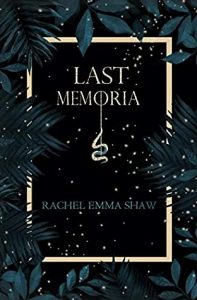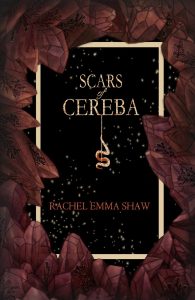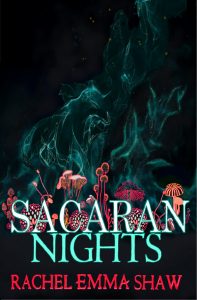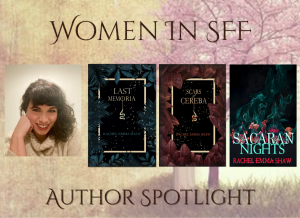Author Spotlight: Rachel Emma Shaw (LAST MEMORIA)
Rachel has a PhD in neuroscience and delights in using the limitless realms of fantasy to explore the nature of life. Her first published novels were Last Memoria, a finalist in SPFBO 6 (2020-21), and Scars of Cereba. The two books together form the Memoria duology, which uses memory to explore what makes us who we are. Alongside her writing and publishing, Rachel also works as a science communicator for a UK charity, runs a London-based writing group and has more plants than can be considered normal.
Welcome to the Hive, Rachel!
Let’s start with the basics: dazzle us with an elevator pitch! Why should readers check out your work?
Because how else will you know what sort of stories a socially-odd, plant-loving ex-neuroscientist would create? Hint, they’re complete with vine-like monstrosities that can steal memories, houses covered in fungi, and they tend to leave readers emotional wrecks. Any takers? If you’re looking to be fascinated and broken emotionally, then do I have a treat for you!
[Editor: can confirm.]
 Tell us a little something about your writing process – do you have a certain method? Do you find music helps? Give us a glimpse into your world!
Tell us a little something about your writing process – do you have a certain method? Do you find music helps? Give us a glimpse into your world!
Eek – music! It makes my writing more emotive, but those writing sessions frequently descend into karaoke, so it’s a bit of a double-edged sword. Mostly, I rely on my many writing groups to keep me from singing, but that works better with in-person sessions than online ones. Apparently people keep catching me singing to myself while I’m on mute…
Speaking of worlds, what inspires your worldbuilding? Do you have a magic system/s? If so, can you tell us a bit about it?
Most of mine start with something I’ll initially dismiss as impossible/suicidal to write, then remembered that those are exactly the type of stories I like to tell. I love exploring the unknown, and if I get lost down a writing ravine, then I just have to write my way out of it. I’ll get out eventually. Although, I can get stuck down there for quite some time…
As for what I create, worldbuilding is where my love of nature takes front and centre stage. I’m fascinated by the natural world – from extinct species to the network of fungi that allows plants to talk with one another. Where history-buff authors use historical events to inspire their stories, I use the natural world, and Sacaran Nights is a prime example of that. It’s a city of constant night, where bioluminescent fungi grow on imported-wooden beams that hang in the middle of streets, casting an eerie blue glow over the city. Cool – huh?
What (or who) are your most significant fantasy influences?
Has to be Robin Hobb. She showed me that you could write emotive, heart-wrenching stories in fantasy settings. Some fantasy books are the literary equivalent of Fast and Furious films – lots of flash-bang sword fights and battles – but Robin Hobb’s value emotion in stories, and I will always be grateful to her for that.
“Literary equivalent of Fast and Furious films” is going down in the Hive Hall of Fame for Quotes…
 As a self-published author, you have to encompass many roles yourself: what aspect of self-publishing do you find the most difficult? Alternatively, which have you enjoyed the most?
As a self-published author, you have to encompass many roles yourself: what aspect of self-publishing do you find the most difficult? Alternatively, which have you enjoyed the most?
Least like – self-cheerleading. As a trad published author, you’re surrounded by people who tell you how great you are – their paychecks depend on you! But you don’t get that as an indie, and I’m particularly bad when it comes to imposter’s syndrome. Even after SPFBO – a competition that gives validation to indie authors – I still doubt myself. I believe my getting into the finals was a fluke, and when I see a good review, I’ll assume the reviewer is lying. This level of self-doubt is a real problem. Having a trad-cheerleading squad would help, but as an indie, I’ll just have to get a decent therapist instead.
[Editor: *squirts Rachel with a water pistol* stop that.]
Most like – the ability to direct my own publishing efforts. I had a trad-publishing deal for my first book, Last Memoria, and decided not to go with it, wanting to see how the literary sausage gets made. I know so much more about how the markets work now. And I get why literature is evolving as it is – which besides theological discussions about the meaning of life, is an absolute favourite subject of mine (Stories and evolution – what’s not to love???).
Your novel Last Memoria was a finalist for SPFBO 6. People can have vastly different experiences in the contest, so how was your experience?
Incredible. There were tough moments and a lot of sleep lost to anxiety. A few frustrations like how finalist-worthy semi-finalists often don’t get the recognition they deserve, but for the most part, SPFBO6 made my year. I went into it hoping for validation (which faded quickly for reasons mentioned above), but the network of other authors and reviewers I connected with remains, and that’s worth so much more.
Have you read anything by any of your fellow competitors that you really enjoyed? If not, are there any that have piqued your interest?
I read most of my fellow finalists from SPFBO6 and loved them all. And there are quite a few for this year’s SPFBO that I’m eagerly watching to see how well they do.
 In your Cover Reveal post for Sacaran Nights, you talked about designing the cover yourself. What is your process for creating covers for your books?
In your Cover Reveal post for Sacaran Nights, you talked about designing the cover yourself. What is your process for creating covers for your books?
I design my books’ covers because I love the process. I used to paint, but then writing took over, so cover designing is how I retain that part of my life. Plus, if ever I’m struggling with a particular plot problem/need to let ideas percolate, then I’ll do some cover designing and it helps me focus. It’s also great to see the image come together in a way you can’t with a story. Admiring the number of words you’ve written in a day only goes so far…
There are always many iterations before I reach the cover I end up using. For Sacaran Nights, the others were more muted. They lacked the brilliance needed to convey the beauty and energy of Sacara – yes, I know it’s a city of rot and death, but trust me, it’s weirdly beautiful down there! It’s filled with decay, but somehow has a mesmeric draw that pulls you in.
Every writer encounters stumbling blocks, be it a difficult chapter, challenging subject matter or just starting a new project. How do you motivate yourself on days when you don’t want to write?
Usually by working on something in the periphery of writing. This is the benefit of self-publishing. If something isn’t working, then I give my brain time to think by diverting my efforts to the publishing side of being an indie author. I’ll write a blog post, work on the cover, create more illustrations for inside the book. That way, it feels like my time isn’t wasted.
The world shifts, and you find yourself with an extra day on your hands during which you’re not allowed to write. How do you choose to spend the day?
And I’m not allowed to design covers/market/edit/audionarrate/anything else either?
No Rachel.
Then I would probably drag my friends to a patch of wilderness somewhere and have a board game/Dungeons and Dragons day. If they couldn’t make it, then I would dust off the old paintbrushes and let my brain switch off for the first time in… eek, years.
One of our favourite questions here on the Fantasy Hive: which fantastical creature would you ride into battle and why?
Whatever it is, it would definitely be flying. All my Dungeons and Dragons characters end up flying on something or other into a fight. I think my ideal would be some sort of psychic fire-breathing hippogriff. If such a creature exists, then please let me know.
Can you tell us a little something about your current work(s) in progress?
Definitely! I’m halfway through the sequel to Sacaran Nights, which means lots of death, fungi and sassy characters. I’m also working on a standalone too. It builds on a short story being published in a fantasy anthology about grief, mental health and healing. The magic system is just too fascinating not to explore further. It’s more emotionally dark like Last Memoria than physically dark like Sacaran Nights, and it’s probably going to be the most psychologically scarring of the lot – both for me and my readers. I’m so excited!
Finally, what is the one thing you hope readers take away from your writing?
What a great question!
[Credits to Mike Everest Evans!]
I think my answer is comfort. My stories are bittersweet, melancholic and heart wrenching, but no matter how dark they are, they’re also cathartic. They help readers process emotions and explore who they are as individuals. If while entertaining my readers with an interesting plot, feisty characters and a fascinating world, I’ve also managed to help them think about life in a different light, then that means everything to me.
Thank you so much!
And thank you for asking such great questions! I see people posting such lovely things about the Hive online, and I can see why you’ve built up such a wonderful reputation for supporting authors. You’re all just so passionate about books – it’s incredible to have connected with you all!
That is very kind of you Rachel, thank you, and we loved having you on the Hive!
Sacaran Nights is due for release October 2021. You can pre-order it, or check out the Memoria Duology, on:
Amazon.co.uk | Amazon.com | Rachel’s Website

